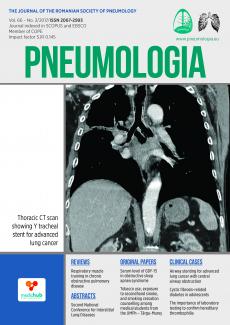Original Papers
MEFV gene mutations (M694V, V726A, M680I, and A744S) in Iranian children with Henoch-Schönlein Purpura
Ahmad-Ali Nikibakhsh1, Mohammad Houshmand2, Morteza Bagheri3, Hashem Mahmood Zadeh2, Isa Abdi Rad3,41. Nephro-Urology Research Center, Urmia University of Medical Sciences, Iran; 2. Department of Pediatric, Motahary Hospital, Urmia University of Medical Sciences, Urmia, Iran; 3. Department of Genetics, Motahary Hospital, Urmia University of Medical Sciences, Urmia, Iran; 4. Cellular and Molecular Research Center, Urmia University of Medical Sciences, Urmia, Iran
Abstract
Introduction: Henoch-Schönlein purpura (HSP) is the most common systemic vasculitis in children. Several risk factors play important role in pathogenesis of HSP. We aimed to study the MEFV gene mutations (M694V, V726A, M680I, and A744S) in Iranian children with HSP. Material and Methods: 50 unrelated pediatric cases were studied regarding M694V, V726A, M680I, and A744S mutations using ASO-PCR method.
Results: 24% of cases had a mutation. 22% of cases had M694V mutations. One out of 50 (2%) patients had V726A mutation. In 76% of cases no mutation was determined. In other hand, 13 out of 100 alleles (13%) were carrier for one mutation. 12 out of 100 alleles had M694V mutations (%12) and 1 out of 100 alleles had V726A mutation (%1). In 87 out of 100 alleles no mutation was detected. M680I and A744S mutations were not found in tested group. Mutation study and analysis demonstrated that the most frequent mutation was M694V (22%). Frequency of alleles were 0.12, 0.01,0,0,0.13, and 0.87 regarding M694V, V726A, M680I, A744S, total mutation, and wild type alleles, respectively. Our findings imply that M694V was dominant mutation.
Conclusions: This report as the first investigation of its kind in Iranian Azeri Turkish patients implying that M694V mutations are more frequent in tested group in comparison with general population. So it is suggested that investigation of M694V mutations should be considered as genetic test for diagnosis of HSP among Iranian Azeri Turkish patients.
Keywords: MEFV gene, M694V, V726A, M680I, A744S, mutations, Iranian, HSP
Knowledge and Attitudes towards Tuberculosis in Non Medical Students University of Belgrade
Milos Smolovic1, Dragica Pesut1,2, Milica Bulajic3, Marija Simic11. School of Medicine University of Belgrade, Internal Medicine Department, Belgrade, Serbia; 2. Clinical Centre of Serbia, Teaching Hospital of Pulmonary Diseases, Belgrade, Serbia; 3. University of Belgrade Faculty of Organizational Sciences, Laboratory of Statistics, Belgrade, Serbia
Background: Population's knowledge on tuberculosis (TB) is crucial in early seeking of medical care. Delay in diagnosis for any reason contributes to advanced forms and TB transmission in the community. Knowledge about TB in general population of Serbia is poor, including vulnerable groups.
Aim: to assess knowledge about TB in a group of non medical students in University of Belgrade, their attitudes towards TB patients, sources of medical information they use or desire. Methods - observational, questionnaire based study. University students of the Faculty of Organizational Science and Faculty of Geography completed the 27-item questionnaires voluntarily and anonymously. The questions related to TB etiology, way of transmission, risk factors and the source of health information students preffer. Statistical analysis was performed.
Results: All the participants (69 students aged 20±0.777 years, 69.7% male, 30.3% female ) previously heard about TB, mostly describing it as pulmonary disease. Only 22 (31.88%) selected bacillus as the only cause of TB, and 20% selected answer „I do not know". TB is curable (95%). One third does not know about TB symptoms and 45/69 (65%) think that TB is an infectious disease. Majority (78.3%) would pay visit to TB patient, ½ with fear of infection that is in positive correlation with knowledge on infectiousness (p=0.041). Television is the most common used source of health information. Students have the greatest confidence in doctors' information.
Conclusion: Students' knowledge on TB is inadequate, especially on its cause and way of transmission. More effort is needed in university students' health education.
Keywords: tuberculosis, knowledge, university students, questionnaire, attitude
Article
Symptoms of anxiety and depression in patients with chronic obstructive pulmonary disease
Ljudmila M. Nagorni Obradovic1,2a, Dragica P. Pesut1,2a, Dragana Maric1,2a, Jovana Maskovic2, Nadja P. Maric1,2b, Marija Mitic Milikic1,2a1. School of Medicine University of Belgrade; 2. Clinical Centre of Serbia, aTeaching Hospital of Lung Diseases, Belgrade; Clinical Centre of Serbia, bTeaching Hospital of Psychiatry, Belgrade, Serbia
Abstract
Introduction: Despite the prevalence and importance of anxiety and depressive symptoms in chronic obstructive pulmonary disease (COPD) patients, procedures for routine screening in therapeutic protocols are not commonly used. Objective: to assess the symptoms of anxiety and depression in COPD patients and to evaluate their relation to patients' demographic parameters and clinical characteristics.
Methods: The research included 40 COPD patients, treated at the Institute of Lung Diseases and Tuberculosis, Clinical Centre Serbia in Belgrade, from November 2010 to February 2011. Study data were assessed by the questionnaire designed for the purposes of the present study together with Hamilton Anxiety Rating Scale (HARS) and Hamilton Depression Rating Scale (HDRS). Results: Mean HARS score was 10.7 (SD=6.5) (22.5% subjects scored≥17) and mean HDRS score was 10.7 (SD=8.2) (20.0% subjects scored ≥17). Depression was significantly higher in women (Z=-1.971: p=0.049). Lower value of forced expiratory volume in one second (FEV1) correlated with higher HDRS score (ρ=-0.321; p=0.042). The incidence of anxiety and depression symptoms is higher in patients with more hospitalizations and longer hospital stay.
Conclusion: The prevalence and importance of anxiety and depressive symptoms in COPD patients require implementation of a specific questionnaire as the procedure for routine screening in order to detect affective symptoms early and to prevent the progression.
Keywords: COPD, anxiety, depression, screening, prevention




 MEFV gene mutations (M694V, V726A, M680I, and A744S) in Iranian children with Henoch-Schönlein Purpura
MEFV gene mutations (M694V, V726A, M680I, and A744S) in Iranian children with Henoch-Schönlein Purpura